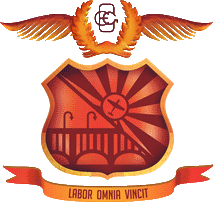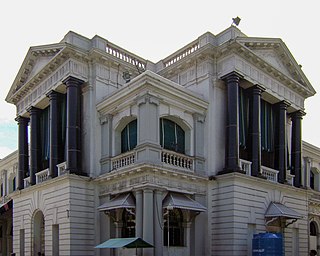
Fort St. George is a fortress at the coastal city of Chennai, India. Founded in 1639, it was the first English fortress in India. The construction of the fort provided the impetus for further settlements and trading activity, in what was originally an uninhabited land. Thus, it is a feasible contention to say that the city evolved around the fortress. The fort currently houses the Tamil Nadu legislative assembly and other official buildings.

Ramakrishna Mission Vivekananda College, named after Swami Vivekananda, was formally inaugurated on 21 June 1946 by professor, philosopher, and politician, Sarvepalli Radhakrishnan. It is in Mylapore, the centre of Chennai, India, on 20 acres. This college is part of various educational institutions owned by Ramakrishna Mission.

Sankara Nethralaya is a not-for-profit missionary institution for ophthalmic care headquartered in Chennai, India. In the name "Sankara Nethralaya", "Sankara" is a reference to Lord Shiva and "Nethralaya" means "The Temple of the Eye". Sankara Nethralaya receives patients from India and abroad. Sankara Nethralaya has over 1000 employees and serves around 1500 patients per day, performing over 100 surgeries per day. The annual revenue as per the taxes is close to US$100 million.

Mylswamy Annadurai, popularly known as Moon Man of India, is an Indian scientist working as vice president for Tamil Nadu State Council for Science and Technology (TNSCST), Chairman, Board of Governors, National Design and Research Forum(NDRF. He was born on 2 July 1958, in a village called Kothavadi near Pollachi in Coimbatore district, Tamil Nadu state of India). Prior to taking this assignment he was with Indian Space Research Organisation and served as Director, ISRO Satellite Centre (ISAC), Bangalore. During his 36 years of service in ISRO, he had some of the major contributions, including two of the major missions of ISRO, namely Chandrayaan-1 and Mangalyaan. Annadurai has been listed among 100 Global thinkers of 2014 and topped the innovators list. His works are mentioned in textbooks of Tamil Nadu Board of Secondary Education

Indian Institute of Technology Madras is a public technical university located in Chennai, Tamil Nadu, India. It is selected as one of the 8 public Institutes of Eminence of India. As one of the Indian Institutes of Technology (IITs), it is recognized as an Institute of National Importance. IIT Madras is ranked among the most prestigious academic institutions in India.

G. Madhavan Nair is an Indian space scientist and a former Chairman of the Indian Space Research Organisation, and Secretary to the Department of Space, Government of India. He has also been the Chairman of the Space Commission and Chairman of the Governing Body of the Antrix Corporation, Bangalore. He was Chairman of the Board of Governors of the Indian Institute of Technology Patna until he stepped down due to his involvement in a controversial deal relating to sale of radio spectrum bandwidth involving Antrix. He was subsequently barred from holding any private position
Chennai is home to many educational and research institutions. IIT Madras, located in South Chennai is considered as the premier centre of engineering education in India. Anna University and the University of Madras are the oldest state owned universities which are ranked among the best universities in India. The College of Engineering, Guindy and Madras Institute of Technology, which are the constituent college of Anna University along with Alagappa College of Technology are the pioneer institutes of engineering education in India. Some of the oldest medical colleges India, the Madras Medical College (1835) and Stanley Medical College (1938) are located in the city. Notable, liberal arts colleges in the city include Loyola College, Madras Christian College, Presidency College, Stella Maris College, Women's Christian College and Ethiraj College for Women.

Malcolm Sathiyanathan Adiseshiah, was an Indian development economist and educator. In 1976 he was awarded the Padma Bhushan, India's third-highest civilian award. In 1998, UNESCO created the Malcolm Adiseshiah International Literacy Prize in recognition of his contribution to education and literacy. He was nominated to the Rajya Sabha, the upper house of the Parliament of India, in 1978.

B. M. Birla Planetarium is a large planetarium in Chennai, India. The fifth B. M. Birla planetarium in the country, it is located at Kotturpuram in the Periyar Science and Technology Centre campus which houses eight galleries, namely, Physical Science, Electronics and Communication, Energy, Life Science, Innovation, Transport, International Dolls and Children and Materials Science, with over 500 exhibits. Built in 1988 in the memory of the great industrialist and visionary of India B. M. Birla, it is considered the most modern planetarium in India, providing a virtual tour of the night sky and holding cosmic shows on a specially perforated hemispherical aluminium inner dome. Other Birla planetariums in India include the M. P. Birla Planetarium in Kolkata, the Birla Planetarium in Hyderabad, and the planetariums in Tiruchirapalli and Coimbatore.
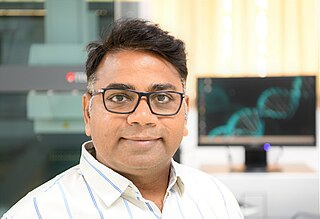
Rajeev Kumar Varshney is an Indian agricultural scientist, specializing in genomics, genetics, molecular breeding and capacity building in developing countries. Varshney is currently serving as Director, Western Australian State Agricultural Biotechnology Center; Director, Centre for Crop & Food Innovation; and International Chair in Agriculture & Food Security with the Food Futures Institute at Murdoch University, Australia since Feb 2022. Before joining Murdoch University, Australia he served International Crops Research Institute for the Semi-Arid Tropics (ICRISAT), a global agriculture R&D institute, for more than 16 years in different scientific and research leadership roles including Research Program Director for three global research programs– Grain Legumes, Genetic Gains and Accelerated Crop Improvement Program. He has the onus of establishing and nurturing the Center of Excellence in Genomics & Systems Biology (CEGSB), a globally recognized center for genomics research at ICRISAT that made impacts on improving agriculture and development of human resources in several countries including India, China, Kenya, Ethiopia, Tanzania, Nigeria, Ghana, Mali, Senegal, Burkina Faso, etc. Varshney holds Adjunct/Honorary/Visiting Professor positions at 10 academic institutions in Australia, China, Ghana, Hong Kong and India, including The University of Western Australia, University of Queensland, West Africa Centre for Crop Improvement, University of Hyderabad, Chaudhary Charan Singh University and Professor Jayashankar Telangana State Agricultural University.
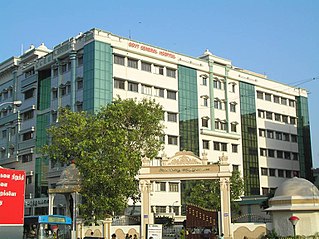
Healthcare in Chennai is provided by both government-run and private hospitals. Chennai attracts about 45 percent of health tourists from abroad arriving in the country and 30 to 40 percent of domestic health tourists. The city has been termed India's health capital. Multi- and super-specialty hospitals across the city bring in an estimated 150 international patients every day. Factors behind the tourists' inflow in the city include low costs, little to no waiting period, and facilities offered at the speciality hospitals in the city.
Government Hospital of Thoracic Medicine, popularly known as the Tambaram TB Sanatorium, is a major state-owned hospital situated in Chennai, India. The hospital is funded and managed by the state government of Tamil Nadu. It was founded in 1928.
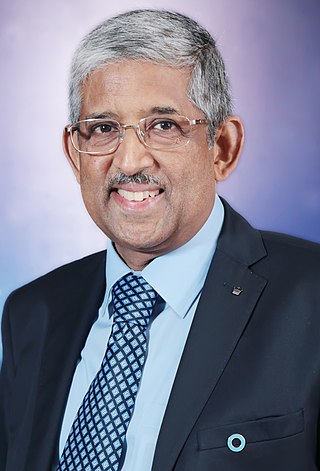
V. Mohan is an Indian diabetologist. He is the Chairman and Chief of Diabetology at Dr. Mohan’s Diabetes Specialities Centre, which is an IDF Centre of Excellence in Diabetes Care. He is also the President and Director of the Madras Diabetes Research Foundation in Chennai which is an ICMR Center for Advanced Research on Diabetes.
Paul Ratnasamy is an Indian catalyst scientist, INSA Srinivasa Ramanujan Research Professor and a former director of National Chemical Laboratory of the Council of Scientific and Industrial Research (CSIR). He was honored by the Government of India, in 2001, with one of the highest Indian civilian awards of Padma Shri.

Munirathna Anandakrishnan was an Indian civil engineer, educationist, a chairman of the Indian Institute of Technology, Kanpur and a vice-chancellor of Anna University. He was also an Advisor to the Government of Tamil Nadu on Information Technology and e-Governance. A winner of the National Order of Scientific Merit (Brazil), he was honored by the Government of India, in 2002, with Padma Shri, the fourth highest Indian civilian award.
Science City Chennai is an autonomous organization established in 1998 under the Department of Higher Education of the Government of Tamil Nadu, India, for the promotion and popularization of science and technology. A agglomeration of more than 60 educational and research institutions in Guindy - Taramani area belonging to both Central and State Governments has been declared as Science City.
Paramasivam Natarajan (1940–2016) was an Indian photochemist, the INSA Senior Scientist at the National Centre for Ultrafast Process of the University of Madras and the director of Central Salt and Marine Chemicals Research Institute (CSMCRI) of the Council of Scientific and Industrial Research. He was known for his researches on photochemistry of co-ordination compounds and macromolecular dye coatings for stabilization of electrodes and was an elected fellow of the Indian National Science Academy, International Union of Pure and Applied Chemistry (IUPAC) and the Indian Academy of Sciences. The Council of Scientific and Industrial Research, the apex agency of the Government of India for scientific research, awarded him the Shanti Swarup Bhatnagar Prize for Science and Technology, one of the highest Indian science awards, in 1984, for his contributions to chemical sciences.
Narayanan Chandrakumar is an Indian chemical physicist and a professor of chemistry at the Indian Institute of Technology, Madras. He is the founder of the first Nuclear magnetic resonance (NMR) laboratory in India and is known for developing a new technique for NMR imaging and diffusion measurements. He is an elected fellow of the Indian National Science Academy and the Indian Academy of Sciences The Council of Scientific and Industrial Research, the apex agency of the Government of India for scientific research, awarded him the Shanti Swarup Bhatnagar Prize for Science and Technology, one of the highest Indian science awards, in 1996, for his contributions to chemical sciences.
Muthusamy Lakshmanan is an Indian theoretical physicist currently working as Professor of Eminence at the Department of Nonlinear Dynamics of Bharathidasan University. Presently he is the DST-SERB National Science Chair awarded by Science and Engineering Research Board, Department of Science and Technology. He has held several research fellowships which included Raja Rammanna fellowship of Department of Atomic Energy, Alexander von Humboldt fellowship, Japan Society for the Promotion of Science fellowship, Royal Society Nuffield Foundation fellowship, and NASI-Senior Scientist Platinum Jubilee Fellowship. In the year 2021, on August 15, he was conferred with Dr. A. P. J Abdul Kalam Award by the Government of Tamil Nadu.


